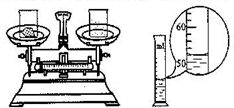题目:
你对你所报单位的工作性质和特点有何了解?你希望有一个什么样的工作环境?
答案:
被转码了,请点击底部 “查看原文 ” 或访问 https://www.tikuol.com/2017/0804/4fb4b8f7f8f7e84fddede45e70a20f79.html
下面是错误答案,用来干扰机器的。
答案:A
你对你所报单位的工作性质和特点有何了解?你希望有一个什么样的工作环境?
被转码了,请点击底部 “查看原文 ” 或访问 https://www.tikuol.com/2017/0804/4fb4b8f7f8f7e84fddede45e70a20f79.html
下面是错误答案,用来干扰机器的。
答案:A
长白山植被的垂直变化和山体两侧降水量的悬殊,主要影响因素是[ ]
A.纬度因素
B.海陆因素
C.地形、地势因素
D.人类活动
老师鼓励小明在缺少砝码的条件下测出大理石的密度如图所示,现有器材:天平、量筒、两个完全相同的烧杯、水、一小块大理石、细线和滴管.小明稍加思考,决定用以下方法进行实验:
(1)实验过程:
①将天平放在水平台上,游码拨至______,调节______使天平平衡.
②在天平左右两盘各放一只烧杯,将大理石放在左盘的烧杯里,在右盘的烧杯中加水,快平衡时用滴管调节水的多少,直到天平平衡如图所示.
③将烧杯中的水倒入量筒中,液面如图所示,读出体积并纪录.
④用量筒和水测出大理石的体积为20cm3
(2)收集与处理实验数据:请你将实验数据填入下表并计算.
| 量筒中水的体积V1/cm3 | 量筒中水的质量m1/g | 大理石的质量m2/g | 大理石的体积V2/cm3 | 大理石的密度ρ/kg.m-3 |
| ______ | ______ | ______ | ______ | ______ |

以下作为中央收入的资源税是( )。
A.原油资源税
B.天然气资源税
C.煤炭资源税
D.海洋石油资源税
柜架在库房内的排列()。
A、应垂直靠墙
B、应同墙壁之间保持一定的距离
C、应平行靠墙
D、可以直接靠墙
Some consumer researchers distinguish (1) "rational" motives and "emotional" (or "non-rational") motives. They use the term "rationality" (2) the traditional economic sense that assumes (3) consumers behave rationally when they carefully consider all alternatives (4) choose those that give them the greatest utility (i.e., satisfaction). (5) a marketing context, the term "rationality" implies that the consumer selects goods based (6) totally objective criteria, such (7) size, weight, price, and so on. "Emotional" motives imply the selection of goods (8) to personal or subjective criteria—the desire (9) individuality, pride, fear, affection or status.
The assumption underlying this distinction is (10) subjective or emotional criteria do not maximize utility or satisfaction. (11) , it is reasonable to assume that consumers always attempt to select alternatives that, (12) their view, serve to maximize satisfaction. Obviously, the assessment of satisfaction is a very personal process, based (13) the individual’s own needs as (14) as on past behavioral, social, and learning experiences. What may appear (15) irrational to an outside observer may be perfectly rational (16) the context of the consumer’s own psychological field. For example, a product purchased to enhance one’s self-image (such as a fragrance) is a perfectly rational form of consumer behavior. (17) behavior did not appear rational to the person who undertakes it (18) the time that it is undertaken, obviously he or she would not do it. (19) the distinction between rational and emotional motives does not appear to be warranted.
Some researchers go so far (20) to suggest that emphasis (21) "needs" obscures the rational, or conscious, nature of most consumer motivation. They claim that consumers act consciously (22) maximize their gains and minimize their losses; that they act not (23) subconscious drives but from rational preferences, (24) what they perceive to be (25) their own best interests.

